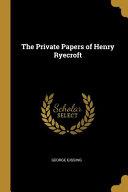Spring, § I, p. 2
The Private Papers of Henry Ryecroft (1903)
Context: Old companion, yet old enemy! How many a time have I taken it up, loathing the necessity, heavy in head and heart, my hand shaking, my eyes sickdazzled! How I dreaded the white page I had to foul with ink! Above all, on days such as this, when the blue eyes of Spring laughed from between rosy clouds, when the sunlight shimmered upon my table and made me long, long all but to madness, for the scent of the flowering earth, for the green of hillside larches, for the singing of the skylark above the downs. There was a time— it seems further away than childhood — when I took up my pen with eagerness; if my hand trembled it was with hope. But a hope that fooled me, for never a page of my writing deserved to live. I can say that now without bitterness. It was youthful error, and only the force of circumstance prolonged it. The world has done me no injustice; thank Heaven I have grown wise enough not to rail at it for this! And why should any man who writes, even if he writes things immortal, nurse anger at the world's neglect? Who asked him to publish? Who promised him a hearing? Who has broken faith with him? If my shoemaker turn me out an excellent pair of boots, and I, in some mood of cantankerous unreason, throw them back upon his hands, the man has just cause of complaint. But your poem, your novel, who bargained with you for it? If it is honest journeywork, yet lacks purchasers, at most you may call yourself a hapless tradesman. If it come from on high, with what decency do you fret and fume because it is not paid for in heavy cash? For the work of man's mind there is one test, and one alone, the judgment of generations yet unborn. If you have written a great book, the world to come will know of it. But you don't care for posthumous glory. You want to enjoy fame in a comfortable armchair. Ah, that is quite another thing. Have the courage of your desire. Admit yourself a merchant, and protest to gods and men that the merchandise you offer is of better quality than much which sells for a high price. You may be right, and indeed it is hard upon you that Fashion does not turn to your stall.

